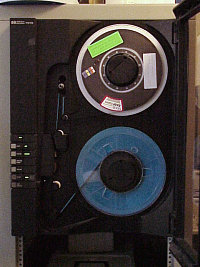February 24, 2010
Redundant resources recover reels of data
 Many HP 3000 customers have been using their systems so long that their data
archives include reels of tape. Plenty of these sites have mothballed their
open-reel tape devices, such as the HP 7980, long ago. This artifact of lengthy
3000 service poses a problem: what if the answer to a query lies on storage media
you can't read onsite anymore?
Many HP 3000 customers have been using their systems so long that their data
archives include reels of tape. Plenty of these sites have mothballed their
open-reel tape devices, such as the HP 7980, long ago. This artifact of lengthy
3000 service poses a problem: what if the answer to a query lies on storage media
you can't read onsite anymore?
Moving data forward onto newer media is a constant task for enterprise IT operations and business critical computing. Even the DAT tapes of the prior decade are looking aged by 2010, and DAT didn't ever have the data reliability that reel tapes exhibited from the 70s onwards. The 3000 community counts on multiple resources to make that data migrate onto newer media.
Ted Johnson at Wake Forest University noticed more than 10 years worth of important data in his shop and started looking for a service supplier to migrate it. "We have over a decade of W-2 information sitting on this media that we have no method of reading," he said. "We'd like to get the information onto a CD or DVD." All 15 tapes' worth of data would fit on a single CD or DVD, Johnson figured.
The single best place to look for this kind of service is at reeltapetransfer.com, a Web page operated by Keven Miller, who consults for 3000 sites from his 3k Ranger company. It's $25 a reel to convert to raw ASCII for moving to a newer medium. But Miller, who once worked on the development team for HP's MM II ERP software, also includes links to other 3000 service companies who migrate data away from reels.
Allegro Consultants also has tape recovery services on offer, a link that Miller is happy to share from reeltapetransfer.com. (Allegro's services include some insider knowledge of the 3000's STORE format to help extract data from problem tapes, as well as troubled disks.) Mark Ranft's Pro 3k consultancy also performs this kind of data transfer.
Migrations can start in many places, from older 3000 hardware to newer models, or at an operating environment level where the application code remains largely unchanged using the AMXW emulation suite from Speedware. The Support Group will migrate a 3000 system out of your datacenter and into theirs, so the management and maintenance of a 3000 becomes TSGi's work. But at the most basic level, archived data needs to keep moving to supported media, regardless of what environment you've built your IT around.
The redundant nature of this kind of service is typical of the 3000 community. The IT pros who take care of data from the 20th Century understand the belt-plus-suspenders kind of practices that generated backups that are still sound enough to restore more than a decade later -- so long as the media has been kept up to date.
